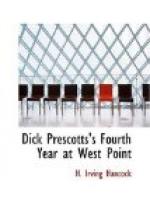“I wasn’t there,” replied Stubbs. “I was over at the rifle range, you know.”
“Then I’ll tell you what happened.”
Cadet Jordan began a narration of the scene that had ended in his being relieved from engineering instruction that forenoon. Jordan didn’t exactly lie, which is always a dangerous thing for a West Point cadet to do, but he colored his narrative so cleverly as to make it rather plain that Cadet Prescott had acted beyond his real authority.
“Still,” argued Stubbs doubtfully, “there must have been some reason. I’ve known Prescott ever since he entered the Academy, and I never saw anything underhanded in him.”
“I wouldn’t call it underhanded, either,” explained Jordan. “Prescott’s manner with me might much better be described as overbearing.”
“It would have been underhanded, had he reported you when you were really doing nothing unmilitary or improper,” interposed Stubbs quickly.
“Are you trying to defend the fellow?” demanded Jordan swiftly.
“No; Prescott, I think, is always quite ready to attend to his own defence. But I’m astonished, Jordan, at the charge you make against him, and I’m trying to understand it.”
“What I object to, more than anything else,” insisted Jordan, “was his making a fool of me before new yearlings. That is where I think the greatest grievance lies. First classmen are men of some dignity. We are not to be treated like plebes, especially by any members of our own class who may be dressed in a little brief authority. Sit down, won’t you, Stubbs?”
“No, thank you, Jordan. I must be on my way soon.”
“But I want to get you and a half a dozen other representative first classmen together,” wheedled Jordan. “I think we should all talk this over as a strictly class matter. Then, if I’m convinced that I’m in the wrong, I’m going to stop talking.”
Crafty Jordan didn’t mean exactly what he said.
He would stop talking, if convinced, but he didn’t intend to be convinced. He was after Dick Prescott’s scalp. Jordan well knew that, at West Point (and at Annapolis, too, for that matter) class action against a man is severer and more irrevocable than even any action that the authorities of the Military Academy itself can take. He wanted to put Prescott wholly in the wrong in the matter. Class action could, at need, drive Prescott out of the corps and end his connection with the Army. For, if a man be condemned by his class at West Point, the feud is carried over into the Army as long as the offender against class ethics dares try to remain in the service.
At the least, Jordan hoped to stir up class feeling to such an extent that, if Prescott were not actually “cut” by class action, at least his popularity would be greatly dimmed.
“So won’t you take part in the meeting?” coaxed Jordan, as Cadet Stubbs moved toward the door.
“I don’t believe I will,” replied Mr. Stubbs. “I’d feel out of place in such a crowd, for I’ve always considered myself Prescott’s friend.”




